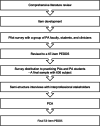Developing and evaluating an instrument to assess perceptions of an entry-level physician associate doctoral degree
- PMID: 35962352
- PMCID: PMC9375372
- DOI: 10.1186/s12909-022-03668-1
Developing and evaluating an instrument to assess perceptions of an entry-level physician associate doctoral degree
Abstract
Background: Most health professions in the United States have adopted clinical or practice doctorates, sparking an ongoing debate on whether physician assistants/associates (PAs) should transition from a master's to a doctorate as the terminal degree for the profession. Although more studies are anticipated, there is no validated instrument assessing perceptions of various stakeholders regarding an entry-level PA doctoral degree. The objective of this study was to develop and evaluate a novel self-report measure to assess perceptions of an entry-level PA doctoral degree.
Methods: A multifaceted, mixed-methods approach was adopted. Based on a comprehensive literature review of the doctoral transition experiences in other health professions, an initial version of perceptions of an entry-level terminal PA doctoral degree scale (PEDDS) was generated. This scale was pilot tested with a group of PA faculty, students, and clinicians. Then, a cross-sectional survey consisting of 67 items was conducted with a national random sample of practicing PAs and PA students. Additionally, semi-structured interviews were conducted to ensure the validity of PEDDS. A principal component analysis (PCA) was conducted to reduce the number of items and reveal the underlying structure of PEDDS.
Results: The PCA confirmed 10 factors of PEDDS consisting of 53 items as the best-fit factor structure with adequate internal consistency of subscales. Those factors include a) expected positive impact on the PA profession, b) expected impact on prerequisites, (c) expected impact on the student preparedness as PA faculty and educators, (d) expected impact on the student preparedness as clinicians, (e) expected impact on accreditation and certification, (f) expected impact on curriculum, (g) expected impact on PA educators, (h) expected positive impact on diversity, (i) expected negative impact on the PA profession, and (j) expected impact on the student competency.
Conclusions: The present study highlights the need to develop valid and reliable measurements to assess perceptions regarding the transition to the entry-level doctorate across health professions. This study could be used to guide further discussion of the entry-level doctorates for PAs and other health professions by bridging the gap of existing literature related to valid, reliable, and standardized measures on this topic.
Keywords: Entry-level doctoral degree; Health professions education; Instrument; Measures; Perceptions; Physician assistants/associates.
© 2022. The Author(s).
Conflict of interest statement
The authors declared that they have no competing interest.
Figures
References
-
- Royeen C, Lavin MA. A contextual and logical analysis of the clinical doctorate for health practitioners: dilemma, delusion, or de facto? J Allied Health. 2007;36(2):101–106. - PubMed
-
- Seegmiller JG, Nasypany A, Kahanov L, Seegmiller JA, Baker R. Trends in doctoral education among healthcare professions: an integrative research review. Athl Train Educ J. 2015;10(1):47–56. doi: 10.4085/100147. - DOI
-
- American Association of Colleges of Nursing. AACN position statement on the practice doctorate in nursing. 2004. https://www.aacnnursing.org/News-Information/Position-Statements-White-P... Accessed 12 Jun 2020.
-
- Plack MM, Wong CK. The evolution of the doctorate of physical therapy: moving beyond the controversy. J Phys Ther Educ. 2002;16(1):48–59. doi: 10.1097/00001416-200201000-00008. - DOI
Publication types
MeSH terms
LinkOut - more resources
Full Text Sources
Miscellaneous



